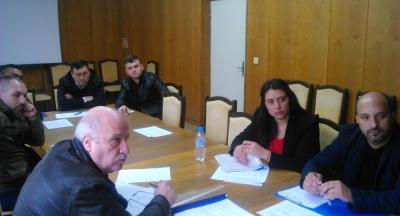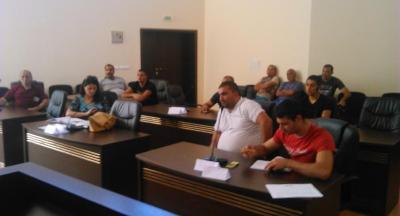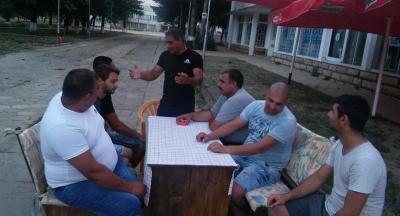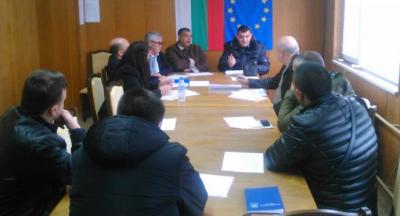Nikola Kozlevo
*Disclaimer: The information and views set out in this page do not necessarily reflect the official opinion of the Council of Europe and/or the European Commission. Neither the Council of Europe, the European Commission nor any person acting on their behalf may be held responsible for the use which may be made of the information contained therein.
The municipality of Nikola Kozlevo is located in the North-East part of Bulgaria, in Shumen Administrative Region. The municipality includes 11 settlements (Vekilski, Valnari, Karavelovo, Krasen Dol, Kriva reka, Pet mogili, Ruzhitsa, Harsovo, Tzani Ginchevo, Tsarkvitsa and Nikola Kozlevo), Nikola Kozlevo being the administrative center of the municipality.
The Roma population numbers around 3.000 persons and is concentrated in the villages of Nikola Kozlevo, Valnari, Tsani Ginchevo and Tsarkvitsa. 85% of the houses are in a good condition - a big number of Roma work abroad and they come back and invest to improve their housing and living conditions. The remaining 15% of the Roma in the municipality live in illegal shacks with no sanitation. The share of the unemployed persons is big, as well as the number of the Roma having no health insurances. Early marriages are still a common case here. There are still students dropping out from school due to financial reasons or due to lack of interest and motivation.
The ROMACT Process
Nikola Kozlevo municipality joined the ROMACT program in October 2015. The Joint ACTION Plan (Municipal Action Plan for Roma Inclusion) was updated and adopted on 29 November 2016 with Decision of the Municipal Council of Nikola Kozlevo. On 6 December 2016, the Taskforce for Roma inclusion was created.
As of February 2024, ROMACT process is reinforced in Nikola Kozlevo and a new agreement was signed by the Mayor to reinforce the ROMACT cycle in the municipality.
The most stringent problems identified by the Community Action Group are:
| Low attendance rate in schools |
|---|
| Lack of capacity of the teachers to work in multilingual environment |
| Lack of psychologists in schools |
| Poor health mediator interventions |
| Lack of enough nurses in medical offices |
| Lack of emergency medical help |
The Municipality benefited of ROMACT expertise for the following projects :
The expertise provided by ROMACT for municipalities involves training and guidance on preparing project proposals and implementing inclusive policies aimed at improving the living conditions and social integration of vulnerable populations, including the Roma.
* "Concept of municipality Nikola Kozlevo for social inclusion of vulnerable groups" - Funded by the OPHRD & OPSESG.
Budget: 282 000 €
Status : approved
* "Nikola Kozlevo Municipality for Equal Access to Socio-Economic Integration and Education" - - Funded by the OPHRD & OPSESG.
Budget: 324 468 €
Status : approved
* Establishment of a STEM center for natural sciences, research and innovation, Funded by the Ministry of Education, National Program “Establishing school STEM environment"
Status : rejected
* "Water is life" - Funded by the National Fund CULTURE.
Budget : 6 956€
Status : rejected
Trainings provided by ROMACT experts :
Community Action Groups (CAG):
* Advocacy;
* Public speech and communication;
* Local self-governance;
* Process of preparation of the municipal budget;
* Procedures for citizen participation in the work of the Municipal Council and municipal administration;
* Monitoring the implementation of the MAPRI;
* Harmonizing activizm with professionalism;
Local Authorities (LA):
* Identifying available funding opportunities and how to linking them with priorities;
* Inclusive Roma Policies and Project Planning under EU Operational Programmes;
* Setting up the Municipal Taskforce;
* Legal solutions to reduce illegal housing ;
* Identifying ways to integrate the priorities of MAPRI in the Municipal Development Plan (MDP)
* Monitoring the implementation of the MAPRI;
* Approaches for working with and within Roma community. Working in intercultural environment;
* Implementing a project under the integrated procedure.
Taskforce :
* Monitoring and evaluation and implementation of the JAP and policy-making on Roma issues.
In terms of implementation of the MAPRI, the following activities were implemented:
* Fees cancellation for all children attending kindergarten;
* Free of charge transportation for secondary school students from the villages to the municipal centre;
* Implementation in all schools of “The future today – education and integration” approved under the OP ‘Education’, procedure BG 05M2OP001-3.002 ‘Educational integration for ethnic minority children and children of refugees seeking protection’, including for instance the appointment of five school mediators
* Appointment of a Municipal specialist on “Ethnic and Integration issues and social activities




